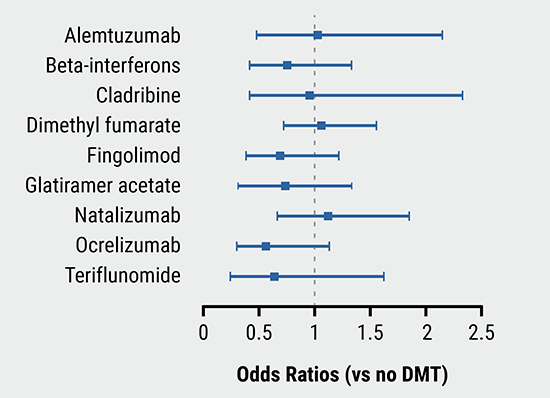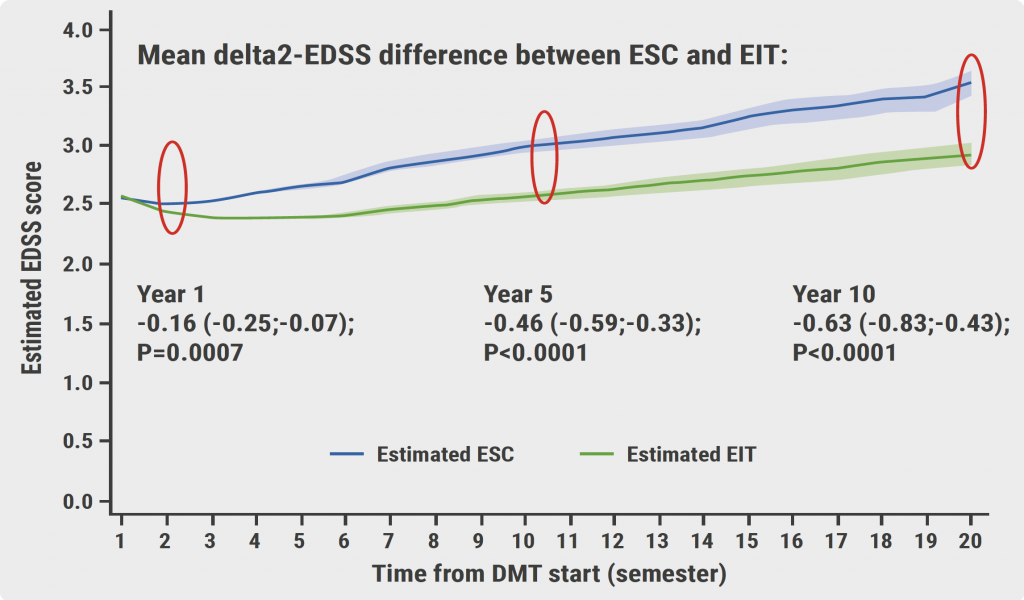Participants of the United Kingdom MS Register (UKMSR) were asked to answer a COVID-19-related survey at admission and a follow-up survey every 2 weeks, depending on whether they reported COVID-19. The mean age of the 5,309 participants was 52.4 years, 76.1% were female. The overall incidence of self-diagnosed COVID-19 in this cohort was 535 (10.1%). In a time when testing facilities were still very limited, 75 of these 535 COVID-19 cases were confirmed by RT-PCR test. The COVID-19 incidence in this cohort peaked during the second week after lockdown started on 23 March 2020 (13.2%) and dropped to 3.5% in the 10th week. Almost half of the MS patients (47%) went into self-isolation during lockdown (23 March–23 June 2020).
The strongest predictor for self-isolation was higher web-based EDSS score (OR 1.389; 95% CI 1.333-1.447). Other predictors were having progressive MS and using monoclonal antibodies or fingolimod as DMT. Older age (OR 0.969; 95% CI 0.957−0.982) and having progressive MS (OR 0.595, 95% CI 0.422−0.838) lowered the risk of COVID-19. This was not surprising, as these populations were more likely to self-isolate. MS duration nor physical disability altered the risk of contracting COVID-19. A multi-variate analysis is required to more accurately predict clinical and demographic risk factors. There was no DMT that was associated with an elevated risk of COVID-19 (see Figure). Of 336 COVID-19 patients of whom data on disease course was available, 249 (74.1%) recovered. The preliminary findings of this study did not show an association between faster recovery and MS-related factors, including EDSS score or DMT use.
Figure: Odds ratios of contracting COVID-19 while on DMT versus no DMT [1]

- Garjani A, et al. COVID-19 in people with MS: A large community-based study of the UK MS Register. MSVirtual 2020, Abstract SS02.01.
Posted on
Previous Article
« Age and EDSS are risk factors for severe COVID-19 Next Article
Letter from the Editor »
« Age and EDSS are risk factors for severe COVID-19 Next Article
Letter from the Editor »
Table of Contents: MS Virtual 2020
Featured articles
COVID-19 and MS
Biomarkers
Treatment Strategies and Results
Management of progressive MS with approved DMT
Novel Treatment Directions
Neuromyelitis Optica Spectrum Disorders
Miscellaneous Topics
Related Articles

December 4, 2023
Early intensive treatment enhances long-term clinical outcomes
December 16, 2020
Novel disease-specific scale confirms huge impact of fatigue
December 9, 2021
MRI more sensitive for disease activity than relapses in SPMS
© 2024 Medicom Medical Publishers. All rights reserved. Terms and Conditions | Privacy Policy
HEAD OFFICE
Laarderhoogtweg 25
1101 EB Amsterdam
The Netherlands
T: +31 85 4012 560
E: publishers@medicom-publishers.com

